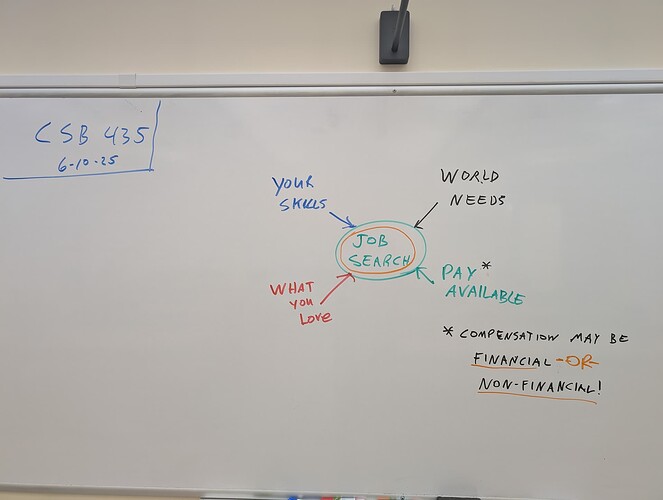My secure software development course got done a week early with required content, so I needed to invent a lesson that would entice soon-to-graduate seniors to show up for one more class session, despite the fact that the content for that session would have no implications for grades, graduation, etc. (Learning for its own sake - what an idea!). These students are very busy finishing other classes and/or holding down jobs, so I wanted the most value-added content possible. What I came up with was the theme of “Facing the Future” Subtext - after graduation - now what?
Here I just want to put a brief outline of how that topic is being addressed. This is turning into a passion project for me, and it looks like next week’s lesson is going to become a sort of dress rehearsal for larger presentations or publications in future cycles. I’d love any input here that might be helpful for next week’s class!
Facing the Future: What Happens After Graduation?
Ikigai-based approach:
- what does the world need?
- what are you good at?
- what do you love?
- what can you get paid for?
On the question of what the world needs, this requires a world view or a theory of which way the world is going and why. A few basic options:
- capitalism is great: all essential future values are priced into current markets.
- capitalism is incomplete: other values (environmental, relational, philosophical, spiritual) must be added to purely financial calculations.
- capitalism must be replaced. The correct answer to “what can you get paid for?” is no one should seek pay at all. We should all be living in co-ops or something communal and shared.
On the question what are you good at? I don’t have a lot of original content. Mostly I just linked to self-assessments like these: Career Assessment Tools | It's Your Yale I do have one somewhat original idea that may be of interest here, however. Over the years in thinking about Spiral Dynamics and related stage theories, I’ve grown to favor thinking of these stages as bundles of skills and behaviors, more than bundles of values and ideas. Modernity or post-modernity are more things people do, not so much the way they view the world. Or, alternatively, perhaps the thinking is fundamentally influenced by the doing.
The question of “what do you love”? is potentially vast. My immediate concern with my target audience of a computer science graduating class was to put psychology and humanistic values on the table in an elegant way that would not require elaborate detours into the humanities in general. (They can take those journeys later - I hope they do!) The article linked below is the one I went with:
It strikes me this is a first stab at the question of, what is an essential psychological theory for social change and personal values alignment? The idea is to get just enough psychology to be useful, while allowing students to also focus on other professions. I’m currently using UTOK with heavy infusions of Vervaeke and McGilchrist, but I’d be curious if others can identify other psychologies or schools of thought as potentially essential for students in general.
On the final question of what students can get paid for, my main advice to students was to supplement job boards and Internet search with as much face-to-face, relational discussion as possible with people already in a profession or industry that seems attractive. I’m a veteran of the meet-up scene, and I strongly suggest job-seeking students to leverage meet-ups. Old, but true: “It’s who you know as much as what you know.”
That’s a lot, but I’m starting to think it’s all an essential package for world-navigation and personal values discovery and articulation. My prior counseling of students was mostly just about what the hot programming languages were, taking a late-capitalist, programmers-always-get-paid, framework as implicit assumptions. 2025 is casting considerable doubt on those implicit assumptions.
